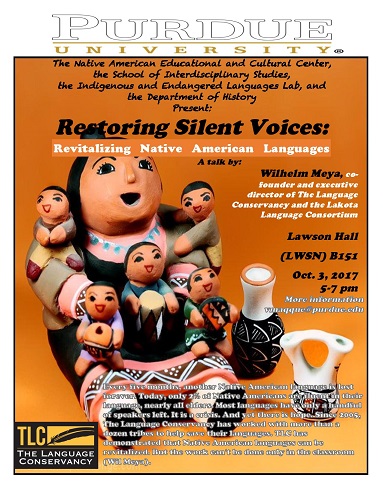
Events
Every semester, we strive to organize events (public lectures, movie screenings, workshops, etc.), which will benefit Purdue students and staff (linguist and non-linguists, alike).
Spring 2025
Purdue Linguistics Symposium 2025
Apr. 11-12, 2025
Spring 2024
IELLab 25th Anniversary Reunion
May, 2024
Purdue Linguistics Symposium 2024
Apr. 12-13, 2024
Spring 2023
Purdue Linguistics Symposium 2023Apr. 14-15, 2023 on Zoom
Fall 2017
Restoring Silent Voices. Revitalizing Native American Languages
Wilhelm Maya, The Language Conservancy
Oct. 3rd, 5:00-7:00 PM @ LWSN B151
Spring 2017 - Walt Wolfram Visit
Our major event in the Spring 2017 semester was a visit from the renowned linguist Prof. Walt Wolfram. The purpose of his visit was to share aspects of The Language and Life Project of North Carolina State University’s Linguistics department. The Language and Life Project documents and showcases linguistic diversity across the United States. During the visit, Prof. Wolfram gave a talk and screened a documentary.
-
Talk: “Linguistic Inequality and Social Justice in Campus Life.”
"The collision of academic prejudice and accent is particularly ironic. academics tend to the centre-left nearly everywhere, and talk endlessly about class and Multiculturalism. (...) And yet accent and dialect are still barely on many people's minds as deserving of respect." (The Economist, January 30, 2015).
Nothwithstanding the current emphasis on embracing diversity on most university campuses, linguistic subordination is still reproduced and enabled at most universities. Furthermore, language diversity remains excluded from or erased in the diversity canon. We conclude, based on the empirical study of linguistic aggressions and micro-agressions by students and faculty on a major university campus, that language differences remain a major source of social inequality and intolerance in higher education. in response to these findings, we have established an innovative language diversity program for universities that targets faculty, staff, and students. Illustrations of the process and the program are presented, and audiovisual productions, products and campus resources are integrated into the presentation.
Watch the Talk ‖ Get the Slides
-
Documentary: "Talking Black in America"
Featuring footage and interviews with people across the country, Talking Black in America presents an informed portrait of language issues specific to African American heritage and culture.
Other Events
-
A screening of another documentary from NC State's Language and Life Project - "First Language: The Race to Save Cherokee." Watch it here.
